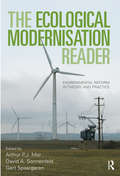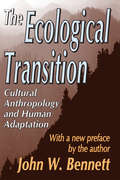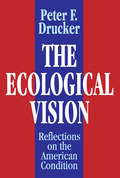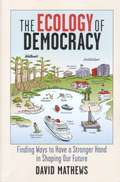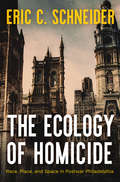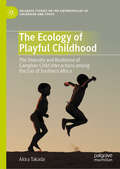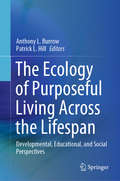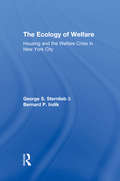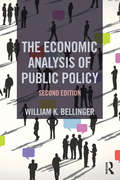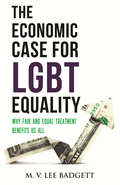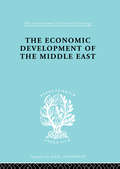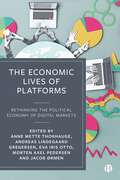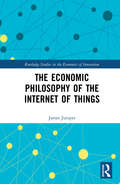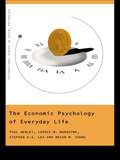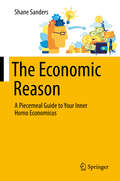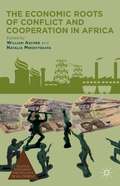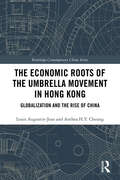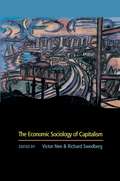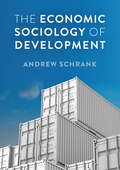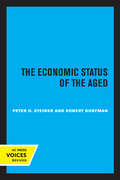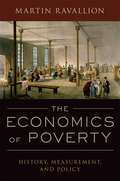- Table View
- List View
The Ecological Modernisation Reader: Environmental Reform in Theory and Practice
by Arthur P.J. MolStructural environmental reform by firms and industries, governmental and intergovernmental agencies, non-governmental organisations (NGOs), and others is a worldwide phenomenon and the focus of this definitive collection. Includes a comprehensive introduction to and overview of Ecological Modernisation Theory; original, state-of-the-art review essays by distinguished international scholars; a selection of the best published works and debates from a quarter-century of related social science scholarship; an emphasis on environmental issues in Asian and other emerging economies; and an agenda for continued scholarship, policymaking, and practice. Accessible to students, policymakers, professionals, executives, and others interested in deeply understanding contemporary environmental issues and taking effective action for environmental solutions. Rigorous and sophisticated for use in graduate and advanced studies. Appropriate for courses in Sociology, Political Science, Policy Studies, Geography, Environmental Studies, Environmental Planning, Business, Economics, Asian Studies, Development Studies, and other fields.
The Ecological Transition: Cultural Anthropology and Human Adaptation
by John W. BennettWritten during the height of the ecology movement, The Ecological Transition is a stunning interdisciplinary work. It combines anthropology, ecology, and sociology to formulate an understanding of cultural-environmental relationships. While anthropologists have been studying relationships between humans and the physical environment for a very long time, only in the last thirty years have questions inherent in these relationships broadened beyond description and classification. For example, the concept of environment has been extended beyond the physical into the social.Although anthropologists have adopted many of the concepts that Bennett develops in the book, he also feels that the central issues have never been addressed, either by anthropologists or by people in related disciplines. The most important of these, in Bennett's opinion, is the failure to incorporate a respect for the environmental in contemporary culture, which would allow making exceptions in certain human practices in order to protect the environment. His point in The Ecological Transition is that a basic cultural change in modern civilization is necessary to achieve this end.Both a theoretical and a practical work, The Ecological Transition emphasizes the relationships between human culture, the physical environment, technology, and social policy. The Ecological Transition is a challenging volume that makes us face the consequences of human behavior in the modern world: its effect on pollution, natural resources, agriculture, the economy, and population, to name just a few areas. The book remains a significant contribution to the discourse on social, economic, and environmental problems. While the book was first published in 1976, it still reads as a contemporary tract.
The Ecological Vision: Reflections on the American Condition
by Peter F. DruckerPeriods of great social change reveal a tension between the need for continuity and the need for innovation. The twentieth century has witnessed both radical alteration and tenacious durability in social organization, politics, economics, and art. To comprehend these changes as history and as guideposts to the future, Peter F. Drucker has, over a lifetime, pursued a discipline that he terms social ecology. The writings brought together in The Ecological Vision define the discipline as a sustained inquiry into the man-made environment and an active effort at maintaining equilibrium between change and conservation.The chapters in this volume range over a wide array of disciplines and subject matter. They are linked by a common concern with the interaction of the individual and society, and a common perspective that views economics, technology, politics, and art as dimensions of social experience and expressions of social value. Included here are profiles of such figures as Henry Ford, John C. Calhoun, Soren Kierkegaard, and Thomas Watson; analyses of the economics of Keynes and Schumpeter;and explorations of the social functions of business, management, information, and technology. Drucker's chapters on Japan examine the dynamics of cultural and economic change and afford striking comparisons with similar processes in the West.In the concluding chapter, "Reflections of a Social Ecologist," Drucker traces the development of his discipline through such intellectual antecedents as Alexis de Tocqueville, Walter Bagehot, and Wilhelm von Humboldt. He illustrates the ecological vision, an active, practical, and moral approach to social questions. Peter Drucker summarizes a lifetime of work and exemplifies the communicative clarity that are requisites of all intellectual enterprises. His book will be of interest to economists, business people, foreign affairs specialists, and intellectual historians.
The Ecology Of Democracy: Finding Ways To Have A Stronger Hand In Shaping Our Future
by David MathewsThe work of democracy is work. Here are some ideas about how it can be done in ways that put more control in the hands of citizens and help restore the legitimacy of our institutions.
The Ecology Of Health And Disease In Ethiopia
by Helmut Kloos Zein Ahmed ZeinThis book examines prevailing human health problems in political, socioeconomic, cultural, and physical/biotic settings of health practitioners and planners in Ethiopia. It also evaluates modern and traditional health resources and examines the occurrence of nonvectored communicable diseases.
The Ecology of Homicide: Race, Place, and Space in Postwar Philadelphia
by Eric C. SchneiderLike so many big cities in the United States, Philadelphia has suffered from a strikingly high murder rate over the past fifty years. Such tragic loss of life, as Eric C. Schneider demonstrates, does not occur randomly throughout the city; rather, murders have been racialized and spatialized, concentrated in the low-income African American populations living within particular neighborhoods. In The Ecology of Homicide, Schneider tracks the history of murder in Philadelphia during a critical period from World War II until the early 1980s, focusing on the years leading up to and immediately following the 1966 Miranda Supreme Court decision and the shift to easier gun access and the resulting spike in violence that followed.Examining the transcripts of nearly two hundred murder trials, The Ecology of Homicide presents the voices of victims and perpetrators of crime, as well as the enforcers of the law—using, to an unprecedented degree, the words of the people who were actually involved. In Schneider's hands, their perspectives produce an intimate record of what was happening on the streets of Philadelphia in the decades from 1940 until 1980, describing how race factored into everyday life, how corrosive crime was to the larger community, how the law intersected with every action of everyone involved, and, most critically, how individuals saw themselves and others. Schneider traces the ways in which low-income African American neighborhoods became ever more dangerous for those who lived there as the combined effects of concentrated poverty, economic disinvestment, and misguided policy accumulated to sustain and deepen what he calls an "ecology of violence," bound in place over time.Covering topics including gender, urban redevelopment, community involvement, children, and gangs, as well as the impact of violence perpetrated by and against police, The Ecology of Homicide is a powerful link between urban history and the contemporary city.
The Ecology of Playful Childhood: The Diversity and Resilience of Caregiver-Child Interactions among the San of Southern Africa (Palgrave Studies on the Anthropology of Childhood and Youth)
by Akira TakadaWhile studies of San children have attained the peculiar status of having delineated the prototype for hunter-gatherer childhood, relatively few serious ethnographic studies of San children have been conducted since an initial flurry of research in the 1960s and 1970s. Based on the author’s long-term field research among several San groups of Southern Africa, this book reconsiders hunter-gatherer childhood using “play” as a key concept. Playfulness pervades the intricate practices of caregiver-child interactions among the San: immediately after birth, mothers have extremely close contact with their babies. In addition to the mother’s attentions, other people around the babies actively facilitate gymnastic behavior to soothe them. These distinctive caregiving behaviors indicate a loving, indulgent attitude towards infants. This also holds true for several language genres of the San that are used in early vocal communication. Children gradually become involved in various playful activities in groups of children of multiple ages, which is the major locus of their attachment after weaning; these playful activities show important similarities to the household and subsistence activities carried out by adults. Rejuvenating studies of San children and hunter-gatherer childhood and childrearing practices, this book aims to examine these issues in detail, ultimately providing a new perspective for the understanding of human sociality.
The Ecology of Purposeful Living Across the Lifespan: Developmental, Educational, and Social Perspectives
by Patrick L. Hill Anthony L. BurrowThis book explores what it means to live a purposeful life and outlines the benefits associated with purpose across different life domains. It also demonstrates that purpose in life is not reducible to constructs such as happiness, well-being, or identity development.The importance of having a sense of purpose in life is attracting renewed attention in both scientific and social arenas. Mounting evidence from intricately designed experiments and large-scale studies reveals how pursuing a purpose can make a person happier, healthier, and even lengthen their lifespan. However, existing texts on purpose have said little on why having has these effects, how it may influence our ability to navigate diverse environments, or how best to consider the construct from a multidisciplinary approach that moves beyond psychology.Recognizing this gap in the literature, this book provides multidisciplinary perspectives on the topic of purpose, and examines what we can do as researchers, interventionists, and society as a whole to imbue purposefulness in the lives of people across the lifespan. It includes contributions from key figures on topics such as identity, health, youth programs and youth purpose, diversity, aging and work.
The Ecology of Welfare: Housing and the Welfare Crisis in New York City
by George SternliebThe basic ecology of human groups—the relationship between the distribution of population and material resources and the resultant social and cultural patterns—is a subject which has occasioned far more talk than down-to-earth research. Filling this gap, George Sternlieb and Bernard Indik consider one dimension of human ecology— the interplay between housing and outlook, between the physical realities of a dwelling unit and the attitudes and responses of its inhabitants. Their book, The Ecology of Welfare, presents a detailed description of the housing and housing problems of one special subgroup-New York City's welfare recipients in the 1970's.
The Ecology of the School (Routledge Library Editions: Education)
by John EgglestonWithin a single educational system – that of England and Wales – the nature of schooling available to a child can be dramatically different. Even between residential areas the differences in educational climate can be striking. Apart from differences in the organization of schools and the availability of buildings, teachers and resources, there are also significant ideological variations between local education authorities. This book considers the evidence of such differences, some of the environmental factors (political, social and economic) that may account for their distribution, and the consequences that appear to spring from them.
The Economic Analysis of Public Policy
by William K. BellingerA critical analysis of public policy decisions requires a far greater depth of knowledge than can be received from news reports and political speeches. Issues such as how best to reduce traffic congestion, reduce acid rain, improve airline safety or develop a parcel of land are better understood by organizing, measuring and weighing the effects of alternative policies.?The Economic Analysis of Public Policy, now in its second edition, is the ideal introduction to benefit-cost analysis, the economics of efficiency, risk analysis and present value, and is suitable for those with only a modest background in mathematics and economics. This brand new edition of the book has been rigorously updated throughout in terms of examples and data references, issues covered, and layout and pedagogical features. Key concepts are reinforced through multiple problems and discussion questions within each chapter. This latest edition contains extra material on loss aversion, global warming, technology, and US health care reform, as well as a wider range of international examples. Extra tables have been included in order to clarify more complicated issues. Instructors will also benefit from the new companion website, which will offer power point presentations, answers to end of chapter questions, and a test bank. This textbook encourages its readers to understand and apply key concepts whilst also learning to appreciate policy analysis as part of an interdisciplinary, analytical, and political process that can lead to better government policy decisions. It is an ideal teaching tool for undergraduate and postgraduate students engaged in Public Administration, Public Economics, and Public Policy.
The Economic Burden of Providing Health Insurance
by Christine EibnerMore than 60 percent of nonelderly Americans receive health-insurance (HI) coverage through employers. However, rising health-care costs may threaten the long-term viability of the employer-based insurance system. This report explores trends in the economic burden associated with HI provision for small and large businesses, as well as the quality of plans that small and large firms offer.
The Economic Case for LGBT Equality: Why Fair and Equal Treatment Benefits Us All
by M. V. BadgettAn economist demonstrates how LGBT equality and inclusion within organizations increases their bottom line and allows for countries' economies to flourishWe know that homophobia harms LGBT individuals in many ways, but economist M. V. Lee Badgett argues that in addition to moral and human rights reasons for equality, we can now also make a financial argument. Finding that homophobia and transphobia cost 1% or more of a country's GDP, Badgett expertly uses recent research and statistics to analyze how these hostile practices and environments affect both the US and global economies.LGBT equality remains a persistent and pertinent issue. The continued passing of discriminatory laws, people being fired from jobs for their sexual orientation and/or gender identity, harassment and bullying in school, violence and hate crimes on the streets, exclusion from intolerant families, and health effects of stigma all make it incredibly difficult to live a good life. Examining the consequences of anti-LGBT practices across multiple countries, including the US, Canada, the UK, Australia, India and the Philippines, Badgett reveals the expensive repercussions of hate and discrimination, and how our economy loses when we miss out on the full benefit of LGBT people's potential contributions.
The Economic Development of the Middle East (International Library of Sociology)
by Alfred BonneFirst published in 1998. Routledge is an imprint of Taylor & Francis, an informa company.
The Economic Lives of Platforms: Rethinking the Political Economy of Digital Markets
by Anne Mette Thorhauge, Andreas Lindegaard Gregersen, Eva Iris Otto, Jacob Ørmen and Morten Axel PedersenThis interdisciplinary collection rethinks the political economy of the digital market by asking what came before platforms and suggesting what might come after them. By unpacking the concept of ‘platform economies’ into locally embedded variations of digital markets, the book identifies what is new about contemporary platforms and what is characteristic of wider historical, social and economic currents. The diverse team of authors employ various analytical approaches, including in-depth ethnographic studies, and theoretical and analytical reconceptualizations of platforms and the industries they encompass.Tapping into current themes including the decolonisation of the internet, this book offers a timely assessment of the implications of emerging reconfigurations between technology, information, society and markets.
The Economic Philosophy of the Internet of Things (Routledge Studies in the Economics of Innovation)
by James JuniperTo properly understand the nature of the digital economy we need to investigate the phenomenon of a "ubiquitous computing system" (UCS). As defined by Robin Milner, this notion implies the following characteristics: (i) it will continually make decisions hitherto made by us; (ii) it will be vast, maybe 100 times today’s systems; (iii) it must continually adapt, on-line, to new requirements; and, (iv) individual UCSs will interact with one another. This book argues that neoclassical approaches to modelling economic behaviour based on optimal control by "representative-agents" are ill-suited to a world typified by concurrency, decentralized control, and interaction. To this end, it argues for the development of new, process-based approaches to analysis, modelling, and simulation. The book provides the context—both philosophical and mathematical—for the construction and application of new, rigorous, and meaningful analytical tools. In terms of social theory, it adopts a Post-Cognitivist approach, the elements of which include the nature philosophy of Schelling, Marx’s critique of political economy, Peircean Pragmatism, Whitehead’s process philosophy, and Merleau-Ponty’s phenomenology of the flesh, along with cognitive scientific notions of embodied cognition and neural Darwinism, as well as more questionable notions of artificial intelligence that are encompassed by the rubric of "perception-and-action-without-intelligence".
The Economic Psychology of Everyday Life (International Series in Social Psychology)
by Brian Young Paul Webley Carole Burgoyne Stephen LeaFrom childhood through to adulthood, retirement and finally death, The Economic Psychology of Everyday Life uniquely explores the economic problems all individuals have to solve across the course of their lives.Webley, Burgoyne, Lea and Young begin by introducing the concept of economic behaviour and its study. They then examine the main economic issues faced at each life stage, including:* the impact of advertising on children* buying a first house and setting up home* changing family roles and gender-linked inequality* redundancy and unemployment* coping on a pension * obituaries, wills and inheritance.Finally they draw together the commonalties of economic problems across the lifespan, discuss generational and cultural changes in economic behaviour, and examine the significance of other, non-economic constraints, upon individuals.The Economic Psychology of Everyday Life provides a much-needed comprehensive and accessible guide to economic psychology which will be of great interest to researchers and students.
The Economic Reason: A Piecemeal Guide to Your Inner Homo Economicus
by Shane SandersIn a series of conversational essays, this textbook discusses the manner in which economic thought addresses a broad array of everyday issues beyond classical textbook treatments. In the spirit of popular economics books, the author uncovers economic issues and solutions from individuals, businesses, society, and the country as a whole in a decidedly non-technical and relatable manner. Should the federal government mandate use of child safety seats on commercial airlines? Can genetic information substitute for a college degree? The contents of this book touch on many of these contemporary topics in an accessible way. Addressing undergraduate and graduate students, as well as scholars in different fields of economics, this book is a must-read for everybody interested in a better understanding of economic thought.
The Economic Roots Of Conflict And Cooperation In Africa
by Natalia Mirovitskaya William AscherThis book combines overviews of the nature and causes of inter-group violence in North Africa and sub-Saharan Africa with a collection of country case studies. Both the overview chapter and the case studies trace how economic policy initiatives, and consequent changes in the roles and statuses of various groups, shape conflict or cooperation.
The Economic Roots of the Umbrella Movement in Hong Kong: Globalization and the Rise of China (Routledge Contemporary China Series)
by Louis Augustin-Jean Anthea H.Y. CheungIn the autumn of 2014, thousands of people, young and educated in their majority, occupied the chief business district and seat of the government in Hong Kong. The protest, known as the Umbrella Movement, called for ‘genuine democracy’, as well as a fairer social and economic system. The book aims to provide a dynamic framework to explain why socioeconomic forces converged to produce such a situation. Examining increasing inequality, rising prices and stagnating incomes, it stresses the role of economic and social factors, as opposed to the domestic political and constitutional issues often assumed to be the root cause behind the protests. It first argues that globalization and the increasing influence of China’s economy in Hong Kong has weighted on salaries. Second, it shows that the oligopolistic nature of the local economy has generated rents, which have reinforced inequality. The book demonstrates that the younger generation, which is still finding its place in society, has been particularly affected by these phenomena, especially with social mobility at a low point. Offering a new approach to studying the Umbrella Movement, this book will appeal to students and scholars interested in Hong Kong's political landscape, as well Chinese politics more broadly.
The Economic Sociology of Capitalism
by Victor Nee & Richard SwedbergThis book represents a major step forward in the use of economic sociology to illuminate the nature and workings of capitalism amid the far-reaching changes of the contemporary era of global capitalism. For the past twenty years economic sociologists have focused on mesa-level phenomena of networks, but they have done relatively little to analyze capitalism as an overall system or to show how such phenomena emerge from and shape the dynamics of capitalism. The Economic Sociology of Capitalism seeks to change this, by presenting both big-picture analyses of capitalism and more focused pieces on institutions crucial to capitalism. The book, which includes sixteen chapters by leading scholars in economic sociology, is organized around three broad themes. <P><P>The first section addresses core issues and problems in the new study of capitalism; the second considers a variety of topics concerning America, the leading capitalist economy of the world; and the third focuses attention on the question of convergence stemming from the global transformation of capitalism and the challenge of explaining institutional change. The contributions, which follow a foreword by economic historian Avner Greif and the editor's introduction, are by Mitchel Abolafia, James Baron and Michael Hannan, Mary C. Brinton, John Campbell, Gerald Davis and Christopher Marquis, Paul DiMaggio and Joseph Cohen, Peter Evans, Neil Fligstein, John Freeman, Francis Fukuyama, Ko Kuwabara, Victor Nee, Douglass C. North, AnnaLee Saxenian, Richard Swedberg, and Viviana Zelizer.
The Economic Sociology of Development (Economy and Society)
by Andrew SchrankBringing the study of international inequality back into the core of sociological theory, this book offers a user-friendly introduction to development and underdevelopment. In doing so, it places various approaches to the definition, measurement, and understanding of “development” against the backdrop of broader sociological debates. Schrank draws concrete examples from different regions and epochs to explore sociological thinking about development and underdevelopment informed by the latest currents in economic sociology. Across a series of chapters, he identifies relationships between mainstream and Marxist approaches to the study of international inequality; uses classical and contemporary social theory to develop a parsimonious typology of national development outcomes; addresses cross-border learning and diffusion in light of the latest developments in organization theory; considers the roles of religious, racial, and gender identities in the development process in different places and times; and portrays contemporary global challenges ‒ such as populism, pandemics, and climate change ‒ as distinctly sociological problems in need of multifaceted solutions. Enriched with expository figures, tables, and diagrams, this accessible book simultaneously distills and develops the sociological approach to the study of development and underdevelopment for both undergraduate and graduate students across the social sciences.
The Economic Status of the Aged
by Peter O. SteinerThis title is part of UC Press's Voices Revived program, which commemorates University of California Press’s mission to seek out and cultivate the brightest minds and give them voice, reach, and impact. Drawing on a backlist dating to 1893, Voices Revived makes high-quality, peer-reviewed scholarship accessible once again using print-on-demand technology. This title was originally published in 1957.
The Economic and Social History of Brazil since 1889
by Herbert S. Klein Francisco Vidal LunaThis is the first complete economic and social history of Brazil in the modern period in any language. It provides a detailed analysis of the evolution of the Brazilian society and economy from the end of the empire in 1889 to the present day. The authors elucidate the basic trends that have defined modern Brazilian society and economy. In this period Brazil moved from being a mostly rural traditional agriculture society with only light industry and low levels of human capital to a modern literate and industrial nation. It has also transformed itself into one of the world's most important agricultural exporters. How and why this occurred is explained in this important survey.
The Economics Of Poverty: History, Measurement, And Policy
by Martin RavallionThere are fewer people living in extreme poverty in the world today than 30 years ago. While that is an achievement, continuing progress for poor people is far from assured. Inequalities in access to key resources threaten to stall growth and poverty reduction in many places. The world's poorest have made only a small absolute gain over those 30 years. Progress has been slow against relative poverty as judged by the standards of the country and time one lives in, and a great many people in the world's emerging middle class remain vulnerable to falling back into poverty. The Economics of Poverty reviews critically past and present debates on poverty, spanning both rich and poor countries. The book provides an accessible new synthesis of current economic thinking on key questions: How is poverty measured? How much poverty is there? Why does poverty exist, and is it inevitable? What can be done to reduce poverty? Can it even be eliminated? The book does not assume that readers know economics already. Those new to the subject get a lot of help along the way in understanding its concepts and methods. Economics lives through its relevance to real world problems, and here the problem of poverty is both the central focus and a vehicle for learning.
